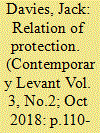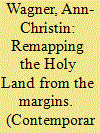|
|
|
Sort Order |
|
|
|
Items / Page
|
|
|
|
|
|
|
| Srl | Item |
| 1 |
ID:
162410


|
|
|
|
|
| Summary/Abstract |
The Black Saturday massacre that took place on 6 December 1975 in Beirut, Lebanon, marked the first large-scale targeting of Lebanese civilians during the Lebanese civil war. The magnitude of the violence committed on that day set the precedent to outbursts of violence between December 1975 and June 1976, namely the Battle of the Hotels, and the Karantina and Damour massacres which were retaliatory in nature. The circumstances surrounding the massacre remain tied to one individual in particular, Joseph Sa`adeh, who initiated the massacre upon learning of the death of his son. Considering that the construction of the Lebanese civil war narrative remains one of the most politically contested and sensitive processes in Lebanon to date, this article examines where personal motivations, grievances and convictions fit in historiographical practices, which are often centred on actions themselves, and are dismissive of the vast personal negotiations that build up to them. The article therefore offers a deeper examination of Lebanese civil war historiography, by stitching together the voices of both fighters and civilians. In doing so, the article also challenges the linear trajectories of war narratives in Lebanon that lend themselves easily to epistemological labels of sectarianism, and often ignore the arbitrariness of people's behaviour in times of extreme stress.
|
|
|
|
|
|
|
|
|
|
|
|
|
|
|
|
| 2 |
ID:
162409


|
|
|
|
|
| Summary/Abstract |
This article takes up a decision from the Refugee Review Tribunal of Australia to recognise a Lebanese woman as a refugee on 11 May 2012. The woman, a Sunni Muslim, had left Lebanon for Australia and applied for that country's protection from her abusive ex-husband, a Maronite Christian. This kind of claim does not typically align with the definition of a refugee, being motivated by ‘personal’ or ‘private’ relations, rather than ‘political’ reasons. The outcome therefore depended not on the veracity or degree of her abuse, but on the ‘systematic and discriminatory’ failure of Lebanese authorities to protect her from it, including police responses and Lebanon's personal status laws. The article argues that the earnest application of international human-rights norms in the Refugee Review Tribunal belies a secular conceit in the superiority of modern law over what it conceives as other, ‘religion-based’, legal systems, a conceit particularly acute with regard to its relative capacity to protect women and deliver gender equality. Building on recent literature on the entanglements of secularism and sexual difference, religious and colonial-era law, and sectarianism and the personal status courts in Lebanon, the article presents the relation of protection extended by the Australian state to the Lebanese woman as contiguous with historical and neo-colonial logics. Finally, the article poses contemporaneous executions of secular Australian sovereignty on Nauru and the seas between Indonesia and Australia to unsettle the sharp distinctions between Lebanon and Australia that enable the decision in file 1202163 [2012] RRTA 396.
|
|
|
|
|
|
|
|
|
|
|
|
|
|
|
|
| 3 |
ID:
162408


|
|
|
|
|
| Summary/Abstract |
Mafraq, a Jordanian border town, has been profoundly reshaped by the influx of Syrian refugees since 2011. As aid agencies were initially absent from the humanitarian response, the gap was filled by faith-based organisations. In an academic and policy environment narrowly focused on security issues, Islamic charities have received considerable attention. However, little is known about the activities of Evangelical groups, let alone Arab Evangelicals, and how giving aid becomes embedded in wider religiopolitical projects. This article explores how the Mafraq Unity Church, an indigenous Evangelical congregation, balances its religious identity with an increasingly professionalised NGO ‘business’. Drawing on fourteen months of ethnographic fieldwork in 2016/17, I argue that through tapping into resources from secular and non-secular transnational networks, the church appeals to two ‘international communities’: the aid industry and Evangelical communities worldwide. The church's rootedness in northern Jordan speaks to the humanitarian sector's recent ‘localization of aid’ agenda, while its benevolent activities are also framed as part of worldwide Evangelism. This allows Jordanian church officials to rhetorically shift Evangelism's centre of gravity to the Global South and move Mafraq closer to the demographic and historical centre of Christianity.
|
|
|
|
|
|
|
|
|
|
|
|
|
|
|
|
| 4 |
ID:
162411


|
|
|
|
|
| Summary/Abstract |
This article discusses shifting narratives of the police in Egyptian cinema before and after the 2011 revolution. It contextualises cinematic representations in a broad socio-historical framework that underlines the significance of the police and their enormous presence in citizens’ everyday lives in Egypt’s political history of state building. In the early years of the independent nation after the 1952 Free Officers’ coup, when the police was considered a ‘patriotic institution’ (mu’assassah wataniyya), Egyptian films showed policemen as heroes, who worked day and night to keep public safety, prevent crime and maintain order on the streets. But later, particularly during the three decades preceding the 2011 revolution, films began to show police brutality, torture methods in jails and prisons, and the corruption permeating the police apparatus in more explicit ways. The article considers thematic and technical ruptures as well as continuities between pre- and post-2011 representations of the police.
|
|
|
|
|
|
|
|
|
|
|
|
|
|
|
|
|
|
|
|
|